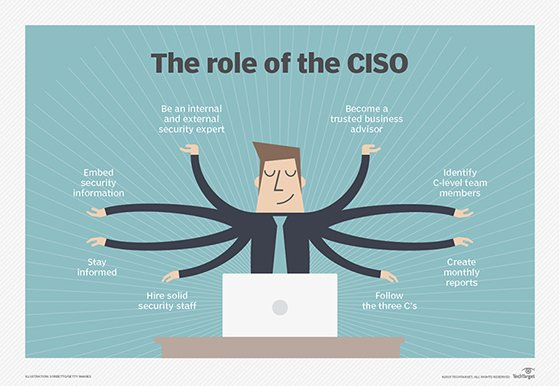January 12 2023 |
There has never been a more crucial time for business information assurance and security. In society today, extraordinary reports, incidents, news, and events related to business information security have evolved into patterns we are accustomed to and have become part of our daily lives. Information security is now everyone’s top concern as a result of the increasing frequency of cyberattacks and regulations.
Organizations are now placing a higher priority on business information security advancements, such as security officer training, risk management certifications, improved technology, policies, and other awareness initiatives, to mitigate business information security threats and vulnerabilities because every business and individual is fair game for cyber attackers.
The CISO is a critical position in any organization, and it is important to understand their responsibilities and the skills they need to possess.
In this piece, we will explore the role of a CISO, the differences between a CIO and a CISO, the three common types of CISO, their responsibilities, the skills they need to have, and why you should hire a CISO for your business. We will also answer some FAQs about the CISO role.
What Is A CISO?
A Chief Information Security Officer (CISO) is a senior-level executive responsible for the development and implementation of an organization’s information security strategy. The CISO is the highest-ranking executive in the organization responsible for all aspects of information security, including developing security policies, procedures and standards, as well as overseeing the implementation of these policies across the organization.
The CISO is in charge of guarding the company against online dangers and reducing the possibility of data breaches. This entails determining and assessing potential security risks as well as putting precautions in place to lessen the possibility of a cyberattack or data breach. The creation of a plan for handling security lapses and incidents falls under the purview of the CISO.
Along with ensuring that the organization’s information systems are secure and in compliance with applicable laws and regulations, the CISO is also in charge of creating and maintaining the organization’s security policies and procedures. The CISO is in charge of informing employees about security best practices and making sure they are all familiar with the company’s security policies, procedures, and that they are followed.

What Is The Difference Between A CIO And A CISO?
The roles of a Chief Information Officer (CIO) and a Chief Information Security Officer (CISO) can be confusing to many. While both positions involve overseeing and managing the technology infrastructure of an organization, there are some key differences between the two roles.
A CIO is responsible for the overall information technology strategy of a company. They are in charge of the technology budget, and they make decisions about which IT initiatives should be pursued. The CIO is also responsible for developing and implementing IT policies and procedures, as well as managing the IT staff.
On the other hand, a CISO is responsible for the security of an organization’s data and systems. They develop and implement security policies and procedures, and manage the security staff. They are also responsible for identifying and mitigating potential security threats, and monitoring the effectiveness of security measures.
The CIO is typically more focused on the day-to-day operations of the IT department, while the CISO is more focused on the security of the organization’s data and systems. The CIO is responsible for ensuring the IT department as a whole is running smoothly, while the CISO is responsible for ensuring the organization’s data and systems are secure.
The CIO and CISO roles are both important for the success of an organization, and both positions should be seen as key components of the organization’s overall strategy. The CIO and CISO should collaborate closely to ensure the organization’s data and systems are secure and that the IT department is running efficiently.
What Are The Three Common Types Of CISO?
The three common types of CISO are the Strategic CISO, the Technical CISO, and the Business Information Security Officer. Each type of CISO has different roles and responsibilities within an organization. Let’s take a closer look at each type of CISO and what they do.
The Strategic Information Security Officer (SISO)
The SISO works to keep top-level business security goals, emerging threats, and the awareness of security teams consistently in alignment. A roadmap of improvements across people, policies, processes, and technologies is used to achieve this in order to effectively manage anticipated business risks.
Following the completion of planning, the development of a strategic security posture then moves on to identifying vulnerabilities and undesirable activities and responding with a velocity that is consistent with the level of security criticality.
Technical CISO
The TISO’s area of specialty includes technical security controls and management, including critical security operations, functions, and firewall management. Additionally, they work to ensure effective threat monitoring and IDS/IPS infrastructure.
Technical policies, risk analysis, and access controls must be coordinated and managed by the TISO. This person frequently answers to the CIO, CTO, or a senior IT consultant.
Business Information Security Officer
The BISO focuses on handling data security problems that have an immediate effect on the company. For instance, part of their duties include putting best practices for customer information protection and customer-centric technologies into action.
The BISO’s main duty is to educate teams from different organizational departments about the value of best information security practices and how they are a necessary business requirement.
The proposal, development, and implementation of organizational security policies and requirements are also assisted by this professional. The BISO should also be able to coordinate security issues that are specific to businesses. They should function in this capacity within each department or division and answer to the business management, in an ideal world.
Responsibilities Of A CISO
The responsibilities of a Chief Information Security Officer (CISO) are critical to the success of any organization. As the head of the organization’s security team, the CISO is responsible for ensuring that the organization’s systems, networks, and data are protected from cyber threats.
They are also responsible for developing and implementing security policies, procedures, and technologies to protect the organization from cyber threats.
Compliance
The CISO creates security strategies and policies that enable the company to adapt to the constantly changing regulatory compliance. This is especially important for multinational corporations that must adhere to numerous regulations, like the GDPR, whose requirements often come with onerous fines.
In accordance with any new regulations, the CISO should develop these requirements for all stakeholders and create information security initiatives that adhere to them.
Human Resource Management
Employee negligence or incompetence is one of the most popular reasons for data and cyber security breaches today. Because of this, it is the Chief Information Security Officer’s responsibility to develop a strong system that reduces data breaches caused by human error and their overall impact on the company’s cybersecurity posture.
The use of efficient and objective criteria for screening and onboarding security teams that are knowledgeable about current security threats and highly skilled in risk mitigation are among the key duties. This process entails the following steps:
- Implementing verification checks on shortlisted candidates and job applicants
- providing new teams with security training programs during orientation
- Identity and access control policies creation
Disaster Management And Business Continuity
To defend against cyberattacks, the CISO should be able to implement resilient strategies. According to an IBM research study, depending on the company, it takes an average of 150 to 287 days to detect, stop, and address security breaches. It takes between one and three months to manage and contain these data security breaches once they have been discovered.
More than just identifying, averting, and containing potential security attacks are required for cyber risk resilience. It focuses more on hastening recovery from the effects of such security setbacks. Strong crisis management, a communication plan, business continuity planning, and disaster recovery can accomplish this.
Every security incident should be examined, and the CISO should suggest new strategies for improvement and defense.
Onboarding Relevant Stakeholders
Some security initiatives call for a sizeable investment of time, money, and human capital, which can lead to disagreements among the various organizational stakeholders pursuing various business objectives and returns.
As a result, it is the CISO’s duty to assess available business opportunities and contrast the security risks involved that could jeopardize a company’s long-term stability and profitability. The business’s long-term growth and data security initiatives must be protected, so the CISO must weigh these fresh opportunities and come up with a sound solution.
In order to achieve this, it is crucial to hire management professionals who share the same security principles. This makes it simpler to communicate with these stakeholders on a regular basis and to make recommendations for the best budgeting strategies and how they might affect ongoing security projects.

What Skills Should A CISO Have?
The CISO must have a deep understanding of the latest cyber threats, best practices, and technologies. They must also be able to develop and implement a comprehensive security strategy that meets the organization’s needs and objectives. To ensure success, the CISO must have a number of skills and qualities, including:
Technical Knowledge: A CISO must have a deep understanding of the latest threats and technologies, as well as the ability to develop and implement security strategies. They must also be able to assess the organization’s security posture and identify potential weaknesses.
Leadership: A CISO must be able to lead a team of security professionals and manage the security budget. They must be able to develop and implement security policies and procedures and ensure that they are followed.
Communication: A CISO must be able to clearly communicate the organization’s security strategy and objectives to stakeholders, both internally and externally. They must also be able to explain complex security concepts in a way that is easy to understand.
Analytical Skills: A CISO must be able to analyze high level data and identify potential threats. They must also be able to assess the effectiveness of security measures and make recommendations for improvement.
Risk Management: A CISO must be able to identify, assess, and manage risks. They must be able to develop and implement strategies to mitigate risks and ensure compliance with security policies.
Problem-Solving: A CISO must be able to think critically and solve problems quickly and effectively. They must be able to identify potential threats and develop strategies to mitigate them.
Having the right skills and qualities is essential for a successful CISO. A CISO must have a deep understanding of the latest threats and technologies, as well as the ability to develop and implement security strategies.

Why You Should Hire A Ciso For Your Business
When it comes to protecting your organization from the negative effects of cyber threats, having a Chief Information Security Officer (CISO) is essential. A CISO is a senior-level executive responsible for developing and implementing an organization’s information security policy and strategy. They are the ones in charge of identifying, assessing, and mitigating security risks to the organization’s data and systems.
A CISO is an invaluable asset to any organization. They are responsible for developing and maintaining a comprehensive security program, which includes implementing the necessary safeguards to protect the organization’s data and systems from external and internal threats. This includes developing and executing security policies and procedures, implementing technical controls, and monitoring and responding to security incidents.
Hiring a CISO can be a daunting task, as there are many factors to consider when selecting the right candidate. It is important to look for a candidate who is not only knowledgeable in security, but also has the right skills and experience to be an effective leader. Furthermore, the candidate should have a good understanding of the organization’s security needs, as well as the ability to communicate effectively with other departments.
FAQs
What is a CISO?
A Chief Information Security Officer (CISO) is an executive-level role responsible for developing and implementing an organization’s overall information security strategy. The CISO is responsible for protecting the organization’s data, networks, and systems from cyber threats.
What is the difference between a CIO and a CISO?
A Chief Information Officer (CIO) is responsible for the overall technology strategy of an organization, while a CISO is responsible for the security of the organization’s data, networks, and systems. While the CIO focuses on technology strategy, the CISO focuses on security strategy.
What are the three common types of CISO?
The three common types of CISOs are:
- Strategic CISOs, who are responsible for developing and implementing the security strategy.
- Operational CISOs, who are responsible for the day-to-day operations of the security team.
- Technical CISOs, who are responsible for the technical implementation of security measures.
What are the responsibilities of a CISO?
The responsibilities of a CISO include developing and implementing a security strategy, managing the security team, evaluating and mitigating security risks, conducting security assessments, and monitoring the security posture of the organization.
What skills should a CISO have?
A CISO should have a strong understanding of information security principles, risk management, security architecture, and security operations. Additionally, a CISO should have excellent communication and leadership skills.
Why should I hire a CISO for my business?
A CISO is responsible for ensuring the security of your organization’s data, networks, and systems. Hiring a CISO will help protect your organization from cyber threats and ensure that your data is secure.
Final Thoughts: A CISO For Your Company
Any organization seeking to defend its data and assets from online threats must have a Chief Information Security Officer (CISO). It is however highly recommended that you always make sure your CISO is the right type for the job before hiring. Still, it’s best to consider your needs ahead of industry guidelines and tips – so give some thought as to what works based on your needs.
For additional information as you organize your team for success, check out the WireX Systems’ Resource Center. And to see how we solve enterprise challenges with advanced security investigation technologies – head over to our Use Cases page.






